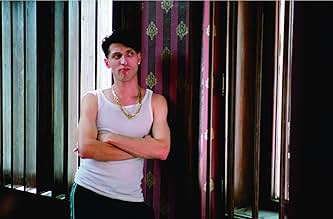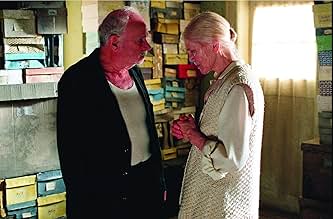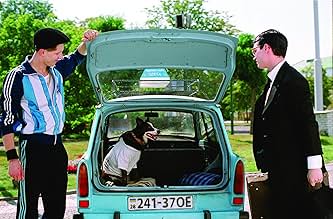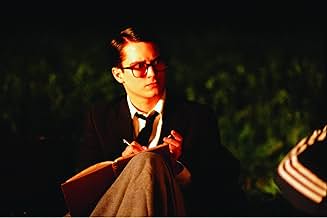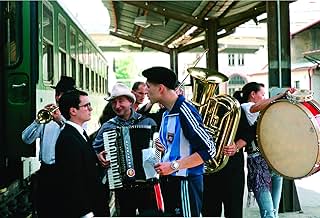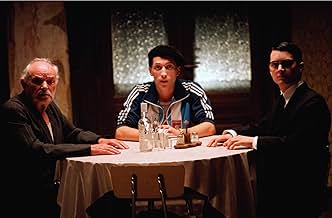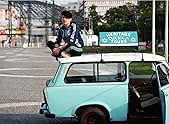Ajouter une intrigue dans votre langueA young Jewish American man, with the help of an eccentric local, endeavors to find the woman who saved his grandfather during World War II in a Ukrainian village that was ultimately razed b... Tout lireA young Jewish American man, with the help of an eccentric local, endeavors to find the woman who saved his grandfather during World War II in a Ukrainian village that was ultimately razed by the Nazis.A young Jewish American man, with the help of an eccentric local, endeavors to find the woman who saved his grandfather during World War II in a Ukrainian village that was ultimately razed by the Nazis.
- Réalisation
- Scénario
- Casting principal
- Récompenses
- 7 victoires et 6 nominations au total
- Grandfather
- (as Boris Leskin)
- Ukrainian Band Member
- (as Sergej Rjabcev)
- Ukrainian Band Member
- (as Jurij Lemeshev)
Avis à la une
I would have given the movie a higher rank, but I feel that the translation from Russian/Ukrainian into English is not done too well. At times, that is clearly deliberate. At times, I could not find a better way to re-tell the situation as it has a slight Lost in Translation effect. At times, it was just poorly done. Thankfully, there are very few poorly done moments. At one point, the English translation is a direct opposite of what the actors actually said.
However, I feel that a significant amount of the humor comes from a deliberate mis-translation from Russian to English. While some viewers may feel that they are left out, there are situations which are difficult to convey in a few phrases that have yeas of history and culture behind them. You definitely get the most out of this movie if you understand Russian. You get even more if you understand the cultural differences between primarily Russian-speaking Odessa and primarily Ukrainian-speaking L'viv. Some anecdotes are simply incorrect, albeit funny.
Regardless of the 8, I still add this movie to my favorites. I feel that much of what is incorrect is left as-is for a reason, and overall, the movie does very well to convey life in Ukraine (the old and the new), the friendliness, though maybe rough up-front, of the people and the story itself. Well done.
Debut director/adapter Liev Schreiber retains some of the humor and language clashes of the novel, mostly through the marvelous Eugene Hutz as the U.S.-beguiled Ukrainian tour guide. He is so eye-catching that the film becomes more his odyssey into his country and his family as he goes from his comfortable milieu in sophisticated Odessa to the heart of a cynical, isolated land that has been ravaged by conquerors through the Communists and now capitalists, with both Jews and non-Jews as detritus. As funny as his opening scenes are when he establishes his cheeky bravura, we later feel his fish-out-of-waterness in his own country when he tries to ask directions of local yokels.
Shreiber uses Elijah Wood, as the American tourist, as an up tight cog in a visual panoply, as his character is less verbal than as one of the narrators in the book. He and Hutz play off each other well until the conclusion that becomes more sentimental in this streamlined plot. Once the grandfather's story takes over in the last quarter of the film, marvelously and unpredictably enacted by Boris Leskin, the younger generation does not seem to undergo any catharsis, as they just tidy up the closure.
Schreiber does a wonderful job visualizing the human urge to document history. One of his consultants in the credits is Professor Yaffa Eliach and her style of remembering pre-Holocaust shtetl life through artifacts clearly inspired the look and it is very powerful and effective.
The Czech Republic stands in for the Ukraine and the production design staff were able to find memorable symbols of change in the cities, towns and countryside, as this is now primarily a road movie, and the long driving scenes do drag a bit. Schreiber retains some of the symbolism from the book, particularly of the moon and river, but having cut out the portions of the book that explain those, they just look pretty or ominous for atmosphere and no longer represent time and fate.
As W.C. Fields would have predicted, the dog steals most of his scenes for easy laughs. In general, Schreiber does go for more poignancy than the book. It is irresistibly touching, especially for those who haven't read the book, but less morally and emotionally messy.
The film is enormously uplifted by its marvelous soundtrack, which ranges from songs and instrumentals from Hutz's gypsy band to traditional tunes to contemporary tracks to Paul Cantelon's klezmer fusion score.
This is not a Holocaust film per se, being a kind of mirror image of "The Train of Life (Train de vie)" as about memory of a time that is freighted with meaning now, but will resonate more with those who have an emotional connection to that history.
The tone of the film, however, shifts when Jonathan and Alex do finally meet the woman they're looking for, and suddenly, this adorable comedy turns into a heart-breaking historical drama about a Jewish village that was annihilated during the Nazi occupation. Everything Is Illuminated is about history, heritage, and the wisdom that can be gained from uncovering the past. It's perfect.
"Everything Is Illuminated" is a strange movie about a weird young man with the compulsive behavior of collecting souvenirs from his family to not forget them that seeks the past of his grandfather to understand how could be his life if his grandfather had not moved to USA. This bizarre vegetarian character meets a dysfunctional Ukrainian family that owns an amateurish travel agency specialized in helping Jews to find missing relatives, and together they have an almost surrealistic road-trip through the country of Ukraine. The movie begins like a comedy, with a sarcastic black humor, and ends in a touching and tragic drama recommended for specific audiences. My vote is seven.
Title (Brazil): "Uma Vida Iluminada" ("An Illuminated Life")
For those who haven't watched the film, perhaps you should stop reading here.
Jonathan is a collector. His love for his grandparents is boundless. He watches as his grandfather dies and as his grandmother is on what appears to be her death bed. On a clear moment, this dying woman gives Jonathan a picture and an amber ornament for his collection. Watching the photograph, taken a long time ago, a young couple are seen together. Watching makes Jonathan think it shows the grandfather and his girlfriend, taken on happier times. Watching the snapshot seems to be the motivation for this intense young man to go looking for his ancestors' past in the Ukraine.
Jonathan has made arrangements with a travel agency, Heritage Tours, of Odessa for his trip to Trochenbrod, the mythical place where his grandfather came from. The agency is handled by an older man, who claims to be blind, and his grandson, Alex, a man who loves the pop American culture that has captured his imagination, as well as his contemporaries in the country. Alex speaks a kind of English no one speaks and his conversation and translation, for Jonathan's benefit are hilarious to our ear for the use of sometimes unheard English terms. The old man insists in taking his dog, Sammy Davis Jr., against the wishes of Jonathan, who doesn't want to sit next to the snarling and barking animal during the trip.
As they embark in search of Trochenbrod, it's clearly that his companions, especially the old man has no clue where he is going. At this point, the film becomes a road movie, as the three characters riding the back roads of the country become more acquainted with one another. As the trio arrive at the sunflower field with the house at the end, it indicates they have indeed come to the right place. Some places are a clear reminder of the conflicts of the past.
The older woman, living in the isolated place, is the missing link of the story. She is able to put things into the right perspective. But here is where the story changes its emphasis from Jonathan, who clearly has come to the land of his ancestors, to the old man. We watch as this older man starts remembering things about himself. This, in turn, changes the dynamic of the film as we discover how connected Jonathan and his guides have been all the time.
Some criticism in these pages have expressed opinions about the accuracy of the story, which after all, it's a work of fiction and liberties have been taken. It would have been impossible to make another film including so much that is contained in the book. The great way the film is divided into different chapters is a clever way to let the viewer know what's about to be seen.
Elijah Wood, a magnificent film actor, does an excellent work by underplaying Jonathan. Mr. Wood makes one of his best appearances in any film with his interpretation of the main character. The felicitous casting of Eugene Hutz as Alex, the Ukranian tour assistant and translator, seems to be an idea made in heaven. Mr. Hutz is about the best thing in the film. His arcane usage of English gives the film a funny angle that delights the viewer. Boris Leskin as Alex's grandfather and driver of the tour car makes a valuable contribution to the film, as well as Laryssa Lauret, who is seen in the last part of the movie.
The excellent cinematography of Matthew Libatique brings the splendor of the Czech Republic's countryside in all its magnificence. The musical score by Paul Cantelon is heard in the background adorning the film in ways that it adds a richness to the movie.
Above all, this is a triumph for Liev Schreiber, the first time director that will surely go far in whatever he decides to do next.
Le saviez-vous
- AnecdotesEugene Hutz's band Gogol Bordello appears as the polka band that greets Elijah Wood at the train station.
- GaffesWhen the Grandfather repeatedly sounds the horn of the car, he presses the middle of the steering wheel to do so. In the Trabant, the horn is activated by pushing the signal light lever forward.
- Citations
Alex: I have reflected many times upon our rigid search. It has shown me that everything is illuminated in the light of the past. It is always along the side of us, on the inside, looking out. Like you say, inside out. Jonathan, in this way, I will always be along the side of your life. And you will always be along the side of mine.
- Crédits fousSeveral songs are credited to the New York punk/Gypsy/Jewish klezmer band, Gogol Bordello, which is led by Eugene Hutz, who plays Alex in the film (the same band greets Jonathan when he arrives on the train). The last of these songs, "Start Wearing Purple (For Me Now)," which plays over the end credits, is credited to both a correct spelling (Gogol Bordello), dg and Gogol Bodello, an incorrect spelling.
- ConnexionsFeatured in Today: Épisode datant du 24 novembre 2005 (2005)
Meilleurs choix
Détails
- Date de sortie
- Pays d’origine
- Site officiel
- Langues
- Aussi connu sous le nom de
- Everything Is Illuminated
- Lieux de tournage
- Sociétés de production
- Voir plus de crédits d'entreprise sur IMDbPro
Box-office
- Budget
- 7 000 000 $US (estimé)
- Montant brut aux États-Unis et au Canada
- 1 712 337 $US
- Week-end de sortie aux États-Unis et au Canada
- 66 806 $US
- 18 sept. 2005
- Montant brut mondial
- 3 601 974 $US
- Durée1 heure 46 minutes
- Couleur
- Mixage
- Rapport de forme
- 1.85 : 1


